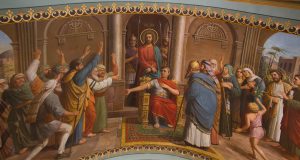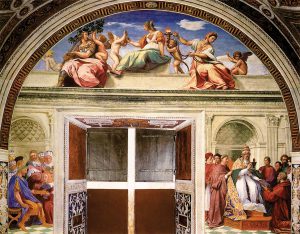
Idyllic sunset on dusty road in countryside
By Renae Kranz
The Word became flesh to make us “partakers of the divine nature”: “The only-begotten Son of God, wanting to make us sharers in his divinity, assumed our nature, so that he, made man, might make men gods.” (CCC 460)
John the Baptist was an infant in his mother’s womb when the Angel Gabriel visited Mary, and Jesus, the very Son of God, was made incarnate. Years later when Jesus was about to begin his public ministry, John knew his role had to change when he said, “He must increase, but I must decrease.” (John 3:30)
During the preparation time of Advent and the celebrating of Christmas, we tend to increase much more than we should. Shopping, planning, decorating and traveling become the main focus of our daily lives.
And let’s not fool ourselves. We let ourselves increase too much all the rest of the year as well. How do we move toward decreasing so we can allow our Lord to increase in our lives?
It turns out, it’s all part of the journey. We just have to point ourselves in the right direction.
The creature and the Creator
The right direction isn’t always obvious. Thankfully, we have a natural desire for happiness that God planted in our hearts. The Catechism tells us He put it there in order to draw us to the One alone who can fill it: God Himself.
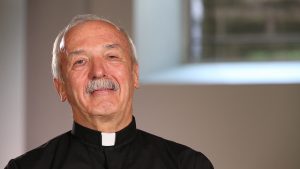
Unfortunately, our first parents didn’t help us out very much right from the beginning. They allowed the sin of pride to darken their souls and in turn ours with original sin. They desired to be like God, and that desire tore all of humanity away from its created purpose.
Today, we still want to be like God. Our pride makes us think we can do this ourselves. It causes us to seek control over our lives and makes us stumble over and over. The perfection we reach for is not possible on our own. It was never supposed to be.
It’s only possible through the Incarnation of Christ. His call to us to be perfect as the Father is perfect isn’t on us to do alone. He came here to show us how to do it.
The Catechism even tells us about the journey to perfection:
Creation has its own goodness and proper perfection, but it did not spring forth complete from the hands of the Creator. The universe was created “in a state of journeying” toward an ultimate perfection yet to be attained, to which God has destined it. (CCC 302)
So we were never meant to take it all on ourselves. The definition of perfection here is not the same as the world’s definition. It’s not about physical beauty, perfect grades or fame. It’s about joining our will to God’s will, because as Jesus told us, without him we can do nothing.
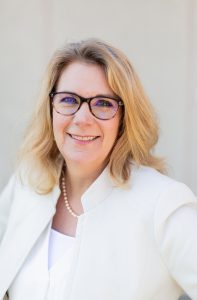
Father Joe Vogel, pastor at St. Teresa of Calcutta, Dakota Dunes, St. Joseph, Elk Point, and St. Peter, Jefferson, says when Jesus emptied himself and became a slave, in a sense he emptied himself of all divinity so he could completely understand our humanity. He experienced hardship, hunger and even temptation. And he showed us how to lean on the Father to walk down the path toward perfection.
Teresa Henrickson, a counselor, spiritual director and member of Sacred Heart, Yankton, says Jesus is our model of holiness.
“The generosity of God is incomprehensible and no one desires my holiness more than God,” she says, “because it means that I am moving in deeper union with him, which is how I was designed.”
It’s how we’re all designed. But sometimes our humanity gets in the way.
How we get off track
Father Vogel sees a common error in thinking among all of us: if I’m not perfect, I won’t be anything. He says we all think we will only be loved when we’re perfect. That is the tendency of original sin.
“To think I’m not good until I’m completely there, that’s always the work of the devil,” Father Vogel says. “The devil would say it’s gotta be all or none. And we’re going to say, no. There’s a little more grace. And there’s a little more mercy.”
Father James Mason, a priest of the diocese and president-rector at Kenrick-Glennon Seminary, says this type of thinking comes about because we usually forget that we live in a fallen world. We tend to underestimate God’s perfection and our own imperfection. This leads to unrealistic expectations, to us straying from the path to holiness, and to sin.
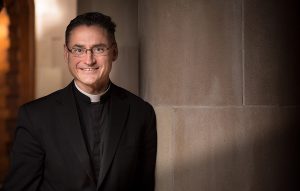
Father Mason points out that we sin because we enjoy it. We even tend to see it as part of our identity. If we didn’t find temporary pleasure in the sin, we would stop doing it on our own. Like our first parents grasping for that apple of power, we are always trying to be equal to God.
“The apple is picked and the true condition, emptiness and shame, is revealed,” Father Mason says. “It brings us a temporary satisfaction and then always leaves us empty.”
Henrickson sees our bent toward sin as us directing our desires toward our own will rather than directing them toward God’s will. Doing our own will, especially when it’s against God’s will, puts us in the position of making ourselves our own god. She says the pursuit of those disordered desires is a way of trying to satisfy whatever longing we have at that moment, all in pursuit of perfection.
“When I’m trying to be my own god, I put it on myself to meet my needs, to make myself holy, to do all these outward performance kinds of measures to determine my worth, my value, my holiness, all this external stuff. And the emphasis is on me versus this open disposition to receive God’s love through Christ and to respond out of that love,” Henrickson says.
This focus on perfectionism seems to be common in our lives today. We see other people’s posts on social media about how great their lives are for example, and we feel the pressure to keep reaching for things we can’t do on our own. Henrickson sees many people tying their worth to the degree to which they perform things really well and tend to be really hard on themselves.
The thing we tend to ignore is this: we can’t do it on our own. We need God to help us. He is the key to our perfection as we work through our journey.
God journeys with us
The Word became flesh in the Incarnation so that He might make the journey to perfection with us, not only at the time He walked the Earth, but even today. Jesus gave us the example to live by.
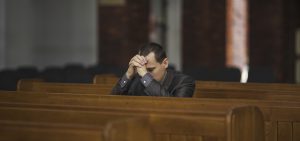 Impossible? Not according to Father Vogel. He says we only need to be intentionally moving toward perfection. And we need to be aware of when we are not moving toward it.
Impossible? Not according to Father Vogel. He says we only need to be intentionally moving toward perfection. And we need to be aware of when we are not moving toward it.
“It’s always good to have friends, family and a support group,” Father Vogel says. “But the closer we are to love and in relation with Jesus and the Blessed Mother, the better. And ask for awareness, ask for help, and die to ourselves. Try saying, I’ll do a little bit, you take over Lord.”
We shouldn’t be trying to reach perfection here in this life. That will be accomplished with the grace of God and the saving sacrifice of Jesus in the next life. We can let go of the pressure to do this ourselves by uniting our will to God’s will.
Teri Kemmer, spiritual director and parishioner at St. Joseph the Workman, Colton, helps those who come to her for spiritual direction recognize how the Holy Spirit is directing them personally. She has seen the tendency to try to control our own lives, to be perfect.
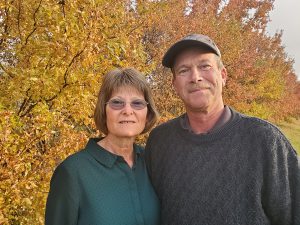
“It is only in letting go that one can let God be God,” Kemmer says. “As we unite our will to God’s, our souls become enflamed with the desire to grow closer to Him, to imitate Jesus and to more intentionally follow the promptings of the Holy Spirit. As we grow in Christ our whole life becomes a pilgrimage.”
This pilgrimage isn’t easy. St. John XXIII said, “See everything. Overlook a great deal. Improve a little.” Father Mason uses this as a reminder that for us, creatures with bodies and souls, change is slow.
“Remember, if it is not slow, it is not human,” he says.
That change comes by being open to God. Henrickson sees her work as a spiritual director as accompanying someone in their relationship with the Lord. She says the Holy Spirit is really the spiritual director, we just need to let Him in.
When you can open yourself up to God, you can start to let go of that control you’re trying to have over your life.
“Then a person can open themselves up to receive God’s love for them, God’s mercy for them, God’s compassion for them. When we receive that love, we can respond to God out of that love,” Henrickson says.
She goes on to say that when we surrender the authority of our life over to God instead of ourselves, we get to be the creature while God gets to be the creator. That’s exactly the way He intended it all along.
St. Alphonsus Liguori said, “Perfection means we are striving to live each and every moment in the grace of God.” That puts this pursuit of perfection in its proper place—a journey with God toward eternal life. It really isn’t all on us. The focus returns to who God is.
This is all boiled down to one simple idea that comes from St. Ignatius Loyola’s teachings on discernment of spirits and the interior movements of the soul. Henrickson clarifies them beautifully: “That which leads us toward God we accept, and that which leads us away from God we reject.”
She says we do this by choosing to move toward what we believe to be God’s will at the moment. To have a proper understanding of His will for us, we must submit to God, grow in virtue and pray for graces. And we need to trust our reason, intellect and knowledge to make the right decision in that moment.
“I think if my focus is on myself, then this call to perfection can be overwhelming,” Henrickson says. “But if I’m growing in union with Christ and in this deepening relationship and am resting in Him and receiving all that He desires to give me, then it’s not overwhelming. Then I get to rely on the work that’s already been done through Christ and the community that He has put before me, the Church.”
As we grow in our relationship with Christ, we will have a greater desire to receive everything God desires for us as individuals. Henrickson says we will then have less desire for the disordered attachments we used to have and an increased desire for virtue.
“I have an increased desire to beg the Holy Spirit to activate those gifts that are in me so that I operate more out of Christ and the Holy Spirit and the Father’s will for me rather than my own will. So God gets to be in charge of that transformation,” she says.
What a beautiful gift we’ve been given. Kemmer reminds us that Jesus has already won the battle. He became incarnate for our salvation. But He doesn’t work alone. We must participate in the journey with Him.
“We are called to put on the armor of God daily. He is always loving us into desiring and choosing Him,” Kemmer says. “Let God love you as you are, as He has created you out of love.”
During this Advent, let the Incarnated One join you on your journey to holiness. The next two pages offer some ideas on how to do just that.
Perfection is only possible in Him. Let Him increase while you decrease.
12 ways to prepare for Christ during Advent
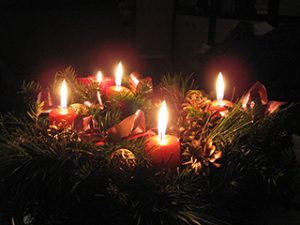 Most of us are rushed through Advent by all the busyness of the season. It’s a shame we let it slip by. Getting ready to greet our newly incarnated Lord on Christmas day can transform your celebration from good to positively glorious. And these ideas can help you decrease and allow our Lord to increase this season.
Most of us are rushed through Advent by all the busyness of the season. It’s a shame we let it slip by. Getting ready to greet our newly incarnated Lord on Christmas day can transform your celebration from good to positively glorious. And these ideas can help you decrease and allow our Lord to increase this season.
- Put an Advent wreath in your home. It symbolizes God’s everlasting love for us. Beginning four Sundays before Christmas, light one candle each Sunday in this order: purple candles on the first and second Sunday of Advent, pink candle on the third Sunday of Advent, and purple candle on the fourth and final Sunday of Advent. It’s a physical reminder of the coming light of Christ.
- Scale back on the busyness of the season so you can sit, listen and wait for the Lord. Simplify your gift list to give fewer but more meaningful gifts. Do the same for your cooking and baking list. Maybe you can make only three varieties of cookies instead of six? Concentrate your shopping to only one or two days if possible so other days can be given over to charity, prayer and reflection. The idea is to allow yourself time to be in waiting.
- Replace the worries of grocery and gift shopping with prayer and service and other activities that bring peace to your home and hope to those around you. Now that you’ve given yourself more time, use that time to be a light to others. And give yourself permission to rest your mind and heart.
- Read the story of Jesus’ birth in Luke’s gospel (Luke 2:1-20). Meditate on those paragraphs. Picture the scene in the stable with the animals nearby and the manger awaiting the baby Jesus. Consider the enormous love the Father has for us that He would send His only Son to live among us, as one of us.
- Recall the lyrics of the hymn “O Come, O Come, Emmanuel” as we wait:
O come, O come, Emmanuel,
And ransom captive Israel,
That mourns in lonely exile here,
Until the Son of God appear.
Rejoice! Rejoice! Emmanuel
Shall come to thee, O Israel. - Set up a Jesse Tree in your home or participate in one at your parish. The Jesse Tree walks you through the major events of the Bible from creation up to Jesus’ birth. It’s a great way to recall all the ways God has walked with us until the Incarnation changed everything. It will also help you consider some of the key Advent characters: Elizabeth, Zechariah, Mary, Joseph, and John the Baptist.
- Light a candle each evening during Advent and take time to pray, think and breathe. The light of the world is about to break through the darkness. He’s about to break through your darkness. Give Him the space to come to you.
- Go to confession to prepare the way of the Lord. The Sacrament of Reconciliation offers us a chance to clear out the guilt of sin and usher in the Lord and His will for us. When we come to him at Christmas with a clean heart, mind and soul, our worship and love can be given freely to the God who comes to redeem us.
- Give to those in need. Be specific in your charitable giving. When you see a need, find a way to fill it. Share your time, your talent and your treasure in new ways. Those in need are waiting for us to bring Christ to them.
- Go to Sunday Mass, even when you’re traveling or feeling too busy. Don’t allow busyness to get in the way of your precious time with the Lord. Sunday Mass is an obligation, yes. But it should be an hour we look forward to and prioritize over all else.
- Read the daily Mass readings or go to daily Mass. If daily Mass isn’t possible for you, reading the daily readings gives you a more complete picture of the season of Advent. Using a tool like “The Word Among Us” or the “Magnificat” devotionals are a big help. The reflections alone are worth a few minutes of reading.
- Share goodwill as the apostles did but in modern ways. Use Advent themes on Facebook and other social media, post “good news” stories, offer words of encouragement to friends and strangers alike. Don’t be stingy with your compliments or your happiness. Let them know by your actions that you’re a child of God.

